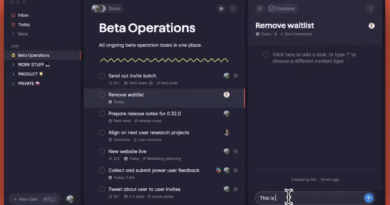Antler’s founder on its vertical AI bet in Southeast Asia
A growing roster of vertical AI startups is emerging in Southeast Asia to serve sectors ranging from seafood to finance. Singapore-based venture capital firm Antler recently made a bet on 37 of them, investing $5.1 million in total for pre-seed deals. Antler also announced a partnership with Khazanah, Malaysia’s sovereign wealth fund.
“If you look at the rest of the world, there’s lots of horizontal AI and it’s becoming insanely competitive,” Antler co-founder and managing partner Jussi Salovaara tells TechCrunch. “What founders are increasingly looking to solve in this part of the world are practical problems in different industries.”
He adds that even though Southeast Asia doesn’t have the talent pool to build something like OpenAI yet, they can take a customer-first approach to AI apps, solving pain points unique to different sectors and markets.
Within verticalized AI, different trends are emerging in each country. For example, Vietnam has a large pool of technical talent. Founders there who are working on a consumer startup usually focus more on the domestic market at first, but B2B startups are more globally-oriented from the beginning, Salovaara says. On the other hand, Indonesian startups tend not to target international expansion because their domestic market is so large, but Antler hopes to see more of them expand internationally.
One of Antler’s investments is BorderDollar, which is building an invoice financing platform for cross border logistics. Since funding structures are different in Southeast Asia than the rest of the world, BorderDollar used their own training data to build a credit scoring system.
“You can’t really take something from the West and then just plug it in here and use that,” says Salovaara.
Another member of Antler’s portfolio is CapGo, which Antler backed in large part because of the founders’ backgrounds: CTO Chen Yu worked on machine learning at Grab and CEO Yichen Guo earned a Harvard MBA and worked at Citi, Almanac and VIPKid as a product manager. CapGo automates data acquisition for market research, a pain point Salovaara is familiar with because he used to work at an investment bank.
“It’s super unclear why you would throw endless amounts of human hours into researching a market when AI can do so much more effectively and efficiently,” he says, adding that CapGo’s competitive moat is its ability to build data sources that are tailored first for Southeast Asia. It plans to expand into the rest of the Asia Pacific region.
Both Zolo and Seafoody were created to solve problems in Southeast Asia’s food supply chain infrastructure. Based in Malaysai, Seafoody was founded by Eleen Kee, Samantha Ooi and Zach Leong. Kee, its CEO, comes from a family that has worked in the seafood industry for several generations. Seafoody is focused on using AI to eliminate middlemen in the seafood supply chain and sell directly to businesses. Zolo, meanwhile, is also simplifying the food supply chain by using AI to shorten the order management process, which usually entails a lot of back-and-forth between suppliers and restaurants on WhatsApp.
Another startup Salovaara highlights is Malaysia-based Coex. It uses AI to digitize project claims and bills of quantity, so approvals, communication and preparing materials can all be performed more quickly. “Construction is obviously one of the most analog and old school industries, so this is largely a play to optimize capital efficiency and operational efficiency,” says Salovaara.
Building a vertical AI startup comes with its own challenges. For example, the right team has to be put together and include not only a technical founder with the right expertise, but also someone who understands the industry they are targeting very well. They also need the right data for training. But once a vertical AI startup comes together, Salovaara says they can build a very deep competitive moat.
“If you want to raise funding for a quote unquote ‘hardcore’ horizontal AI out of Southeast Asia, it would be challenging, especially to enter into a race with a company based in Silicon Valley,” he adds. “Trying to compete with a place that has more talent or a better funding infrastructure in this space, especially at the later stage, is still quite difficult. So these vertical plays are the way to go.”




